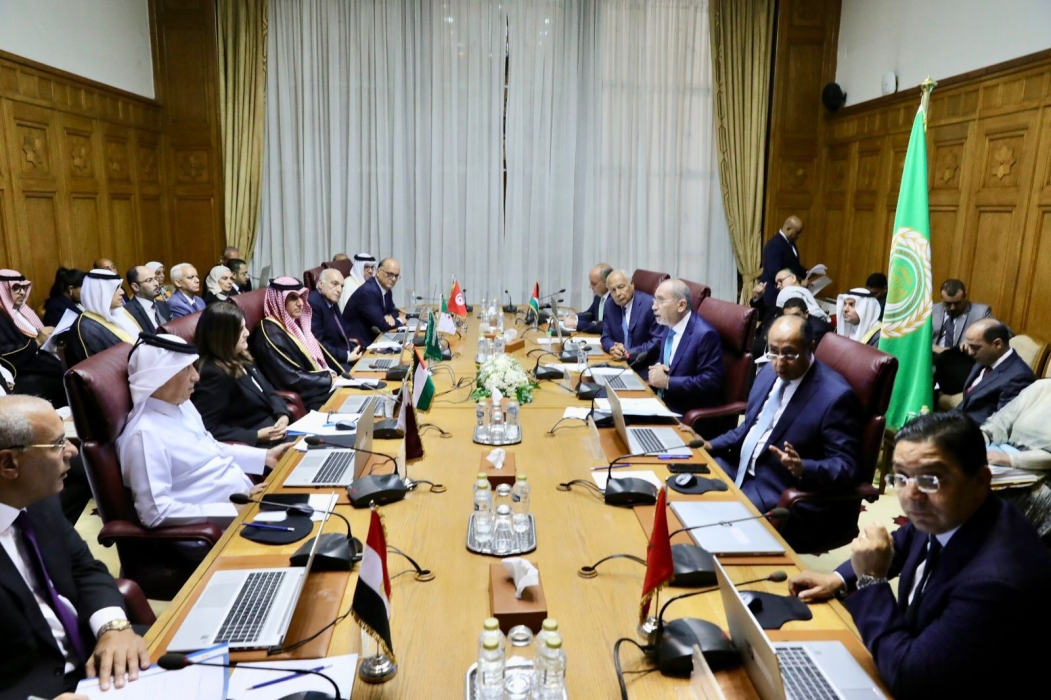- Local News
- Tue-2024-09-10 | 08:32 pm

Nayrouz News Agency :
Deputy Prime Minister and Minister of Foreign Affairs and Expatriates Ayman Safadi led the 8th session of the Arab Ministerial Committee tasked with confronting illegal Israeli policies and actions in occupied Jerusalem.
The meeting, held in Cairo on Tuesday, came ahead of the 162nd regular session of the Arab League Council at the ministerial level.
Safadi outlined Israeli violations in Jerusalem and its Islamic and Christian holy sites, detailing the committee’s efforts since its last session.
He highlighted the dangerous Israeli escalation at Al-Aqsa Mosque/Al-Haram Al-Sharif and discussed the necessary measures to stop these condemned violations, which are occurring alongside the ongoing Israeli assault on Gaza and rising tensions in the West Bank.
He stressed the need to immediately end the Israeli aggression on Gaza and alleviate the humanitarian disaster it has caused, ensuring the continuous and adequate delivery of humanitarian aid throughout the Strip.
Safadi also called for an end to the Israeli escalation in the West Bank and the attacks on Palestinians, warning that the region is on the brink of eruption due to the hardline Israeli government’s policies against Palestinians and its continued land grabs.
The committee members condemned Israel's ongoing violations of the sanctity of holy sites, denouncing them as blatant breaches of international law and a dangerous escalation.
They rejected all Israeli policies aimed at altering the Arab Islamic and Christian identity of Jerusalem and its holy sites, stating these actions undermine the historical and legal status of the city.
The committee also denounced provocative actions by extremist Israeli ministers and officials, including incursions into Al-Aqsa Mosque/Al-Haram Al-Sharif, inflammatory rhetoric calling for the construction of a Jewish temple within the compound, and the Israeli government’s steps to financially support settler incursions, which aim to change the status quo in Jerusalem and its holy sites.
These measures, they warned, could lead to temporal and spatial divisions at the mosque.
The ministers reiterated that Israel has no sovereignty over Jerusalem or its holy sites and reaffirmed the Palestinian people’s legitimate right to establish an independent state along the June 4, 1967 borders, with East Jerusalem as its capital.
They stressed that a two-state solution is the only viable path to achieving a just and comprehensive peace.
The committee affirmed its support for the historic Hashemite Custodianship over Jerusalem’s Islamic and Christian holy sites, emphasizing the role of the Jordanian-administered Jerusalem Endowments and Al-Aqsa Mosque Affairs Department as the sole legitimate authority responsible for managing the mosque and overseeing its affairs.
In a final statement issued after the meeting, the committee agreed on several key actions:
1. Intensifying diplomatic efforts with regional and international organizations to document Israeli violations in Jerusalem and its holy sites, and to highlight Israel's breaches of international law and UN charters.
2. Mobilizing international opposition to Israeli attempts to alter the status quo at Al-Aqsa Mosque/Al-Haram Al-Sharif.
3. Supporting Jordan's efforts to protect Al-Aqsa Mosque and counter illegal Israeli actions aimed at changing the historical and legal status of Jerusalem.
4. Strengthening Arab diplomatic outreach to key global powers, pushing for international sanctions against Israeli officials and settlers responsible for provocations, and ensuring accountability for Israel’s actions in occupied Jerusalem.
The committee called on the UN Security Council to uphold its responsibilities regarding East Jerusalem, referencing several key resolutions, including 252 (1968), 267 (1969), 476, 478 (1980), and 2334 (2016), and urged the international community to take firm steps to prevent further escalation.
The session concluded with a renewed commitment to coordinating international efforts to safeguard Jerusalem’s status and ensure the rights of Palestinians are upheld.
1. Intensifying diplomatic efforts with regional and international organizations to document Israeli violations in Jerusalem and its holy sites, and to highlight Israel's breaches of international law and UN charters.
2. Mobilizing international opposition to Israeli attempts to alter the status quo at Al-Aqsa Mosque/Al-Haram Al-Sharif.
3. Supporting Jordan's efforts to protect Al-Aqsa Mosque and counter illegal Israeli actions aimed at changing the historical and legal status of Jerusalem.
4. Strengthening Arab diplomatic outreach to key global powers, pushing for international sanctions against Israeli officials and settlers responsible for provocations, and ensuring accountability for Israel’s actions in occupied Jerusalem.
The committee called on the UN Security Council to uphold its responsibilities regarding East Jerusalem, referencing several key resolutions, including 252 (1968), 267 (1969), 476, 478 (1980), and 2334 (2016), and urged the international community to take firm steps to prevent further escalation.
The session concluded with a renewed commitment to coordinating international efforts to safeguard Jerusalem’s status and ensure the rights of Palestinians are upheld.










